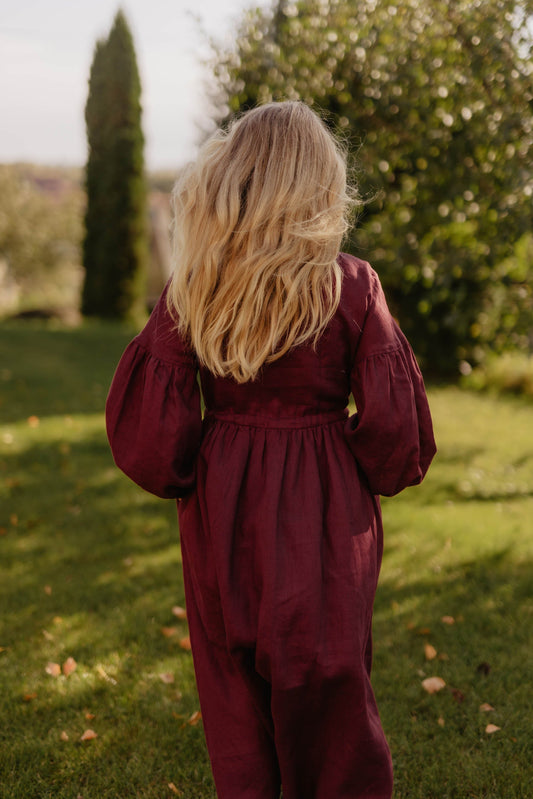
How to Celebrate a Sustainable Christmas with Laumė linen
Share
Choose Sustainability This Christmas
Christmas is a time of joy, celebration, and generosity, but also a time of increased consumption, waste, and environmental impact. Research suggests that during the holiday season, each person produces an additional 1,400 pounds of carbon dioxide emissions (CO2). This is equivalent to about three weeks of driving or about 3.8 percent of an individual’s annual carbon footprint of 36,000 lbs. Our over excessive eating habits during Christmas cause the same carbon footprint as a single car travelling 6,000 times around the globe, according to a University of Manchester study.
How can we enjoy the holiday season without harming the planet and our future? The answer is simple: choose sustainability. Choosing sustainable options for your Christmas decorations, gifts, wrapping, and food can help you reduce your ecological footprint, save money, and support ethical businesses. Here are some tips on how to have a green Christmas.

Sustainable Christmas Decorations
One of the most fun and creative aspects of Christmas is decorating your home with festive ornaments, lights, and garlands. However, many of these decorations are made of plastic, metal, or synthetic materials that are not biodegradable, recyclable, or reusable. They also consume a lot of energy and resources to produce and transport, and often end up in landfills or oceans after a few uses.
To make your Christmas decorations more sustainable, you can opt for natural, organic, or recycled materials that are durable, beautiful, and eco-friendly. For example, you can use:
- Wood. Wood is another natural material that can be used for making or decorating Christmas ornaments, such as stars, snowflakes, angels, or reindeer. Wood is renewable, biodegradable, and versatile. You can either buy wooden ornaments from local artisans or craft stores, or make your own from reclaimed wood, branches, or twigs. You can also paint, carve, or engrave wood to personalize your ornaments.
- Paper. Paper is a recyclable and compostable material that can be used for making or wrapping Christmas ornaments, such as wreaths, garlands, lanterns, or origami. Paper is easy to work with, and you can use different colors, patterns, and textures to create unique and festive designs. You can either buy paper ornaments from eco-friendly brands or make your own from recycled paper, such as newspapers, magazines, or old books. You can also decorate paper ornaments with natural or edible items, such as dried flowers, herbs, spices, or fruits.
- Linen. Linen is a natural fabric made from the flax plant, which grows without the need for fertilizers, pesticides, or irrigation. It is also biodegradable, breathable, and thermoregulating. Linen can be used for various purposes, such as bedding, clothing, tableware, and ornaments. This Christmas you could decorate your home with Christmas bunting rather than garlands, create a beautiful atmosphere with Christmas linen stockings, and make your tree unique with a Christmas tree skirt. You could even elevate your dinning experience for the whole family with festive dinner table accessories. You can find a wide range of linen products at Laume linen, a small family business that creates hand-made linen items that are eco-friendly, high-quality, and beautiful.
 |
 |
 |
 |
Sustainable Christmas Gifts
Another important and enjoyable part of Christmas is giving and receiving gifts. However, many of the gifts we buy or receive are not sustainable, either because they are made of harmful materials, or because they are not useful, meaningful, or long-lasting. According to a survey by Finder, Americans spend an average of $932 on Christmas gifts each year, but also return or exchange about $8,3 billion worth of unwanted gifts. Moreover, many of the gifts we buy or receive are wrapped in non-recyclable or non-reusable materials, such as plastic, foil, or glitter, which add to the waste and pollution problem.
To make your Christmas gifts more sustainable, you can opt for ethical, practical, or experiential gifts that are good for the planet and the people. For example, you can give:
- Ethical gifts. Ethical gifts are gifts that are made of natural, organic, or recycled materials, and that are produced and traded in a fair, transparent, and responsible way. Ethical gifts support the environment, the workers, and the communities involved in their production and distribution. Examples of ethical gifts include organic clothing, fair trade coffee, handmade jewelry, or eco-friendly cosmetics. You can find ethical gifts from certified brands, such as Fairtrade, or Organic, or from local or social enterprises that have a positive impact on society like Laumė linen.
- Practical gifts. Practical gifts are gifts that are useful, meaningful, or long-lasting, and that meet the needs or preferences of the recipient. Practical gifts avoid unnecessary waste, clutter, or dissatisfaction, and instead provide value, satisfaction, or happiness. Examples of practical gifts include books, tools, gadgets, or subscriptions. You can find practical gifts by asking the recipient what they want or need, or by doing some research on their interests, hobbies, or goals.
- Experiential gifts. Experiential gifts are gifts that are not tangible, but rather consist of activities, events, or services that provide memorable or enjoyable experiences. Experiential gifts reduce material consumption, waste, and pollution, and instead promote personal growth, social connection, or fun. Examples of experiential gifts include tickets, vouchers, memberships, or lessons. You can find experiential gifts by considering the personality, passions, or dreams of the recipient, or by exploring the options available in your area or online.
 |
 |
Sustainable Christmas Wrapping
One of the most exciting and surprising parts of Christmas is unwrapping the gifts. However, many of the wrapping materials we use are not sustainable, either because they are not recyclable, reusable, or biodegradable, or because they contain harmful substances, such as plastic, glue, or ink. According to a report by Stanford University, Americans throw away about 25% more trash during the holiday season, including 4 million tons of wrapping paper and shopping bags.
To make your Christmas wrapping more sustainable, you can opt for natural, recycled, or reusable materials that are eco-friendly, attractive, and creative. For example, you can use:
- Linen. Linen is a natural fabric that can be used for wrapping gifts, either as a cloth, a bag, or a ribbon. Bring a touch of elegance, simplicity, and warmth to your gifts this Christmas. You can find linen wrapping materials at Laumė linen- like the furoshiki wrapping cloth or the linen Christmas bag.
- Paper. Paper is a recyclable and compostable material that can be used for wrapping gifts, either as a sheet, a box, or a tag. Paper is easy to work with, and you can use different colors, patterns, and textures to create unique and festive designs. You can either buy paper wrapping materials from eco-friendly brands or make your own from recycled paper, such as newspapers, magazines, or old books. You can also decorate paper wrapping materials with natural or edible items, such as dried flowers, herbs, spices, or fruits.
- Fabric. Fabric is a reusable material that can be used for wrapping gifts, either as a cloth, a bag, or a ribbon. Fabric is versatile, durable, and washable, and it also adds a touch of style, personality, and charm to your gifts. You can either buy fabric wrapping materials from sustainable brands or make your own from old clothes, towels, or sheets. You can also use different techniques, such as knotting, folding, or sewing, to create different shapes and sizes of fabric wrapping materials.

Sustainable Christmas Food
One of the most delicious and satisfying parts of Christmas is enjoying the food. However, many of the food items we consume during the festive season are not sustainable, either because they are not organic, local, or seasonal, or because they are not healthy, balanced, or moderate. According to a report by the World Wildlife Fund, the UK alone wastes 2 million turkeys, 5 million puddings, and 74 million mince pies each year, which amounts to 4.2 million tonnes of CO2. Moreover, many of the food items we consume during the festive season are high in calories, fat, sugar, or salt, which can have negative effects on our health and well-being.
To make your Christmas food more sustainable, you can opt for plant-based, organic, or local food items that are nutritious, delicious, and eco-friendly. Here are some tips on how to have a green Christmas feast:
- Plant-based food. Plant-based food is food that is derived from plants, such as fruits, vegetables, grains, nuts, seeds, or legumes. Plant-based food is low in environmental impact, high in nutritional value, and rich in variety and flavor. Plant-based food can help you reduce your greenhouse gas emissions, water consumption, and land use, as well as lower your risk of chronic diseases, such as diabetes, heart disease, or cancer. You can either go fully vegan or vegetarian, or simply reduce your meat and dairy intake, and replace them with plant-based alternatives. You can find plant-based recipes for your Christmas menu here.
- Organic food. Organic food is food that is produced without the use of synthetic chemicals, such as fertilizers, pesticides, or antibiotics. Organic food is better for the environment, the animals, and the farmers, as it preserves the soil quality, biodiversity, and animal welfare, and reduces the pollution and health risks. Organic food is also better for you, as it contains more nutrients, antioxidants, and phytochemicals, and less residues, additives, or hormones. You can either buy organic food from certified brands, such as USDA, Soil Association, or EU Organic, or from local or community-supported farms or markets.
- Local food. Local food is food that is grown, harvested, or processed within a certain distance from where it is consumed, such as within your city, region, or country. Local food is fresher, tastier, and more seasonal, as it does not require long-distance transportation, storage, or preservation. Local food also supports the local economy, culture, and community, as it creates jobs, income, and social bonds. You can either buy local food from farmers’ markets, farm shops, or online platforms, or grow your own food in your garden, balcony, or windowsill.
| Key Takeaways |
|---|
| Christmas is a time of joy, celebration, and generosity, but also a time of increased consumption, waste, and environmental impact. |
| Choosing sustainable options for your Christmas decorations, gifts, wrapping, and food can help you reduce your ecological footprint, save money, and support ethical businesses. |
| Linen is a natural, durable, and biodegradable fabric that can be used for various purposes, such as bedding, clothing, tableware, and ornaments. |
To Sum It Up
Christmas is a wonderful time of the year, but also a time of great responsibility. Choosing sustainability for your Christmas decorations, gifts, wrapping, and food can help you celebrate the holiday season in a way that is good for the planet, the people, and yourself. You can make your festive season more sustainable by opting for natural, organic, or recycled materials, ethical, practical, or experiential gifts, and plant-based, organic, or local food items.
And for all things linen, look no further than Laumė linen, you're one stop shop for festive decorations and elevating your dining experience this Christmas. And if you want to gift something special browse our store filled with beautiful hand made quality linen products that we are sure you'll love.
Choose sustainability this Christmas, and enjoy a merry, green, and healthy holiday season!



